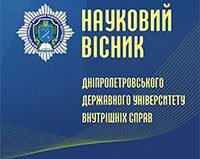Ganna DEKUSAR, Karyna LAHUN
DEKUSAR G., LAHUN K. (2022), THE ROLE OF MOTIVATION IN LEARNING A FOREIGN LANGUAGE BY FUTURE LAW OFFICERS; Scientific Bulletin of Dnipropetrovsk State University of Internal Affairs, Special Issue № 1, 336-342
DOI: 10.31733/2078-3566-2022-5-336-342
ABSTRACT. The work determined that the education system of the Ministry of Internal Affairs of Ukraine is actively changing and modernizing, which, of course, should be taken into account in the methodological context at all levels of education. The study of the problems of motivating cadets should be continuous, it is necessary to constantly look for new technologies, methods and means for effective foreign language learning, which will contribute to the motivation of cadets for foreign language activities and, as a result, to increase the quality of foreign language activities. The relevance of the study is due to the need to ensure the foreign language educational process in institutions of higher education with a teaching method aimed at increasing the motivation of future law enforcement officers.
The fact that English is the language of the whole world and its study should be approached more deeply and studied precisely in its profile, for the police to perceive the information necessary for him in his work, has been determined. Firstly, the English language helps to achieve progress in international cooperation, which is quite important, and secondly, the policeman repeatedly faces a situation when he should explain to the violator the reason for the stop, or for quick and efficient assistance to the victim who has become a hostage of certain circumstances and turn to maybe only to the police.
In accordance with the unstable economic situation and the reform of the law enforcement system, the requirements for the qualifications of police officers are increasing. New forms and methods of training professional police officers with the involvement of information technologies, and new methods of communication improvement in the field of dialogue between the police officer and the community are being introduced. A foreign language is a significant part of the verbal method of negotiating with people, which should be motivated to be developed among police officers.
Keywords: motivation, foreign language, socio-cultural space, law enforcement officers, study, modern teaching methods.
- References:
- Tarnopolskyi O. B. Kornieva Z. M. Aspektnyi pidkhid do navchannia anhliiskoi movy dlia spetsialnykh tsilei u nemovnykh VNZ [Aspect approach to teaching English for special purposes in non language higher education institutions]. Visnyk KhNU im. V. N. Karazina, 2011. Vol. 18. P. 231–239. [in Ukr.].
- Kolbina T. V., Oleksenko O. O. Inozemna mova profesiinoho spriamuvannia: aspekt mizhkulturnoi komunikatsii [Foreign language of professional direction: an aspect of intercultural communication]. Suchasna paradyhma vykladannia inozemnykh mov u zakladakh vyshchoi osvity: tezy dopovidei Mizhuniversytetskoho naukovopraktychnoho seminaru (Kharkiv, 16 kvit. 2019 r.). Kharkiv: Natsionalnyi yurydychnyi universytet imeni Yaroslava Mudroho, 2019. P. 77–81. [in Ukr.].
- Izmailova O. A. Formuvannia inshomovnoi komunikatyvnoi kompetentsii yak strukturnoho komponentu komunikatyvnoi kultury studentiv movnykh VNZ [Formation of foreign language communicative competence as a structural component of communicative culture of students of language universities]. Vykladannia mov u vyshchykh navchalnykh zakladakh osvity. 2010. № 17. P. 66–72. [in Ukr.].
- Hadzevych I. M. Poshuky optymalnykh metodiv ta pryiomiv navchannia na zaniattiakh z kursu “Dilova anhliiska mova” [The search for optimal methods and methods of teaching in classes on the course “Business English”]. Visnyk Zhytomyrskoho derzhavnoho universytetu im. I. Franka. 2004. Vol. 17. P. 44- 45. [in Ukr.].
- Zahalnoievropeiski Rekomendatsii z movnoi osvity: vyvchennia, vykladannia, otsiniuvannia [Pan-European Recommendations on language education: study, teaching, evaluation]. Naukovyi redaktor ukrainskoho vydannia prof. S. Yu. Nikolaieva. Kyiv : Lenvit, 2003. 273 p. [in Ukr.].
- Khodtseva A. O. Osoblyvosti formuvannia profesiinykh komunikatyvnykh navychok u kursi dilovoi anhliiskoi movy [Peculiarities of the formation of professional communication skills in the business English course]. Instytut pedahohiky i psykholohii profesiinoi osvity NAPN Ukrainy. Kyiv. 2010. P. 192- 198. [in Ukr.].
- Pakulova T. V. Communicative competence as a component of the professional skills of the investigator. Scientific Bulletin DDUVS. 2019. Special Issue № 1. P. 297-302. [in Ukr.].
- Dekusar H. H., Davydova N. V. Opanuvannia innovatsiinykh metodiv ta tekhnolohii u formati kompleksnoho pidkhodu pry vykladanni inozemnoi movy v zakladakh vyshchoi osvity nelinhvistychnoho profiliu “Anhlistyka ta amerikanistyka” [Mastering innovative methods and technologies in the format of an integrated approach in teaching a foreign language in institutions of higher education of a non-linguistic profile “English Studies and American Studies”]. Zbirnyk naukovykh prats Dniprovskoho natsionalnoho universytetu im. Olesia Honchara. Vol. 16. Dnipro: Lira. 2019. P. 45-55. [in Ukr.].
- Aloshyna O. M. Suchasni metody ta tekhnolohii vykladannia inozemnykh mov u VNZ [Modern methods and technologies of teaching foreign languages in universities]. Problemy ta perspektyvy formuvannia natsionalnoi humanitarno-tekhnichnoi elity : zb. nauk. pr. red. L. L. Tovazhnianskyi, O. H. Romanovskyi. Kharkiv : NTU KhPI. 2012. Vol. 30-31 (34-35). P. 242–247. [in Ukr.].
- Iakymenko S. S. Innovatsiini osvitni tekhnolohii u vyvchenni anhliiskoi movy, Sch. № 17, Kharkiv [Innovative educational technologies in learning English, Secondary School No. 17, Kharkiv]. URL : http://journal.osnova.com.ua/article/52127. [in Ukr.].
